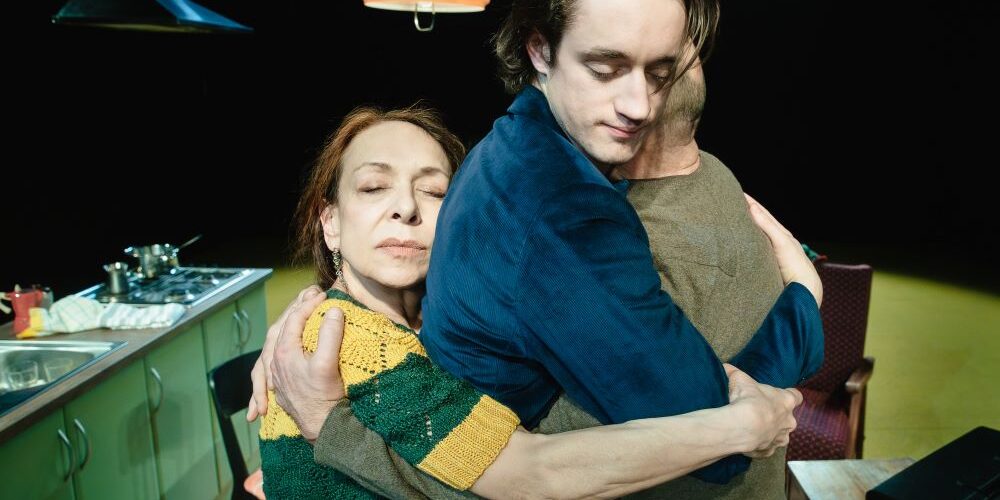Zagreb Youth Theatre, premiere 14th February 2025
A kitchen table is synonymous with family gatherings, the place where everyone sits down to eat together. However, behind the picture-perfect idealized family image, repressed emotions and opinions often hide. Take Ibsen’s plays – a great deal of his work deals with relations between children trying to break free from the invisible umbilical cord that their authoritative parents hold onto too tightly. Ibsen’s young characters often either leave their family home or die tragically, their death unintentionally caused by the parents.
Ivor Martinić’s play A Son, a Mother and a Father Sit at the Table in Silence deals with the potential death of a child but in a different, subtler way with a more modern and frightening approach. The family in the play consists of four characters: Mother (Doris Šarić Kukuljica), Father (Sreten Mokrović), Son (Luka Knez) and Daughter (Petra Svrtan), although there is another son, the youngest child, who isn’t present in the text but is referenced by the other characters. The lack of the second son’s physical presence only enlarges the shadow that is cast over the rest of family. The Daughter is only briefly present as her role in the performance is more of a meta-observer, a commentator to the audience – she is, after all, the middle child, so her character plays into the stereotype of the one who is overlooked.
The play poses a hypothetical question: which child would Mother and Father want to save from global catastrophe when the ‘Doomsday Clock’ strikes midnight. This is described in the play as reaching the ‘fifth danger stage’ – the one that refers to nuclear war or climate collapse, an event which would most likely cause human extinction. As it’s described in the drama, everyone gets a questionnaire which is supposed to help determine who should and shouldn’t survive the apocalypse. From a privileged perspective, this catastrophic scenario might seem distant and over-the-top but one scene in the play depicts a very real weather catastrophe caused by heavy storms and the strong winds that affected Croatia just last year. Nevertheless, the sentiment surrounding the ‘end-is-nigh’ apocalyptic tone opens space for humour, sarcasm and honesty between the characters.
The play is directed by Aleksandar Švabić and this is his second time staging Martinić’s work at ZKM’s smaller hall following It’s Fine as Long as We Die in Due Order (Dobro je dok umiremo po redu) which premiered in 2019. The stage design by Matija Blašković brings warmth with light colours like the yellow floor with a small floorboard square in its centre and a metal roof hovering over it. There’s a small kitchen, a dining table, a wide armchair and an old TV. The performance space is narrowed which affects the atmosphere, making it more tense in the moments of silence. The lighting design by Anton Modrušan also brings warmth and softness with subtle changes that hint what time of day it is.
The performance starts with a short original up-beat song (music composed by Miodrag Gladović) about how we are all going to die and there is nothing we can change about it. It’s clear from the start that, as in other Martinić’s plays, the existential dialogue will be mixed with black comedy which is mostly attributed to his Mother characters. Šarić Kukuljica plays the role of the Mother superbly here, just as she did Elza in As Long as We Die, another mother character that stole the show with her combination of immense love for others and blatant honesty.

A Son, a Mother and a Father Sit at the Table in Silence, Zagreb Youth Theatre
Alongside Šarić Kukuljica, Knez also gives a stand-out performance as the Son, a millennial first-born who has ‘raised himself’ as his Mother describes. His character is successful, rich but distant and cold towards the people who love him – he only knows how to show care through financial support. His hyper- independence affects his health as we see in a scene when he’s experiencing a panic attack and dreams about his own death which scares him. The Son’s soft side is only seen in the scenes with the Daughter, his sister. The two of them find comfort with each other as older siblings whose spotlight was taken from them by the problematic youngest child. Mokrović, likewise, delivers a great performance as a loving Father who may not run the household as Mother does, but will stand up to his own children in her defence. The ‘greyness’ of these characters is what makes their dynamic entertaining and touching to watch – their flaws don’t outshine the love they show for each other.
A Son, a Mother and a Father explores parenthood and family relations while unmasking the idealized trope of the happy, harmonious family. One of the themes it explores is selfishness. Child-free people are often unjustly accused of being selfish for not wanting to have children and focusing on their personal lives. In this play, we see with that sometimes having children as a life’s purpose is selfish, as the Mother says at one point: ‘I would kill myself if I had to enter an empty house. I had you for my sake, not for yours.’
Children are selfish too. They are brought up to be selfish by their parents who will happily give them everything they can, without restrictions. This is beautifully portrayed in a scene where Mother and Father are sunbathing and Son is trying to get as close to the sunlight as possible and blocks the sun from his parents. As an argument about the lack of almond milk in the fridge goes on, the three of them try to get closer to the sunlight, at the same time searching for warmth and burning up from the anxiety of future events.
Even though his plays deal with seemingly everyday situations or discussions with flawed ‘average’ characters, Martinić writes dialogues with such clarity and straightforwardness which easily communicates with the audience. This is especially true when there are elements of dark humour that don’t play on shock value or offensiveness but come from the heart. In the end, the greatest value of his plays is, in my humble opinion, staging a possible relatable ‘real life’ drama conflict that is resolved in a heart-to-heart healthy dialogue without jumping to violence to emotionally intensify the plot. In the end, A Son, a Mother and a Father works as a show, not just because of the great acting performances but because of the way it explores familial dynamics, reminding us that we are all, after all, someone’s child, whether we like it or not.
Credits:
Author: Ivor Martinić //Director: Aleksandar Švabić //Dramaturg: Marin Lisjak //Scenography: Matija Blašković//Costume: Tea Bašić Erceg
For tickets and further information, visit: zekaem.hr
Further reading: Interview with Ivor Martinić: “Dramaturgs are the most underestimated part of the theatre machinery”
Nora Čulić Matošić (1998) is a student of Comparative Literature (MA) at the Faculty of Humanities and Social Sciences in Zagreb. She has written theatre criticism for the Croatian radio programme Theatralia and web portal Kulturpunkt.hr. Besides theatre, her interests are other forms of performing arts (particularly dance performances) and film.








